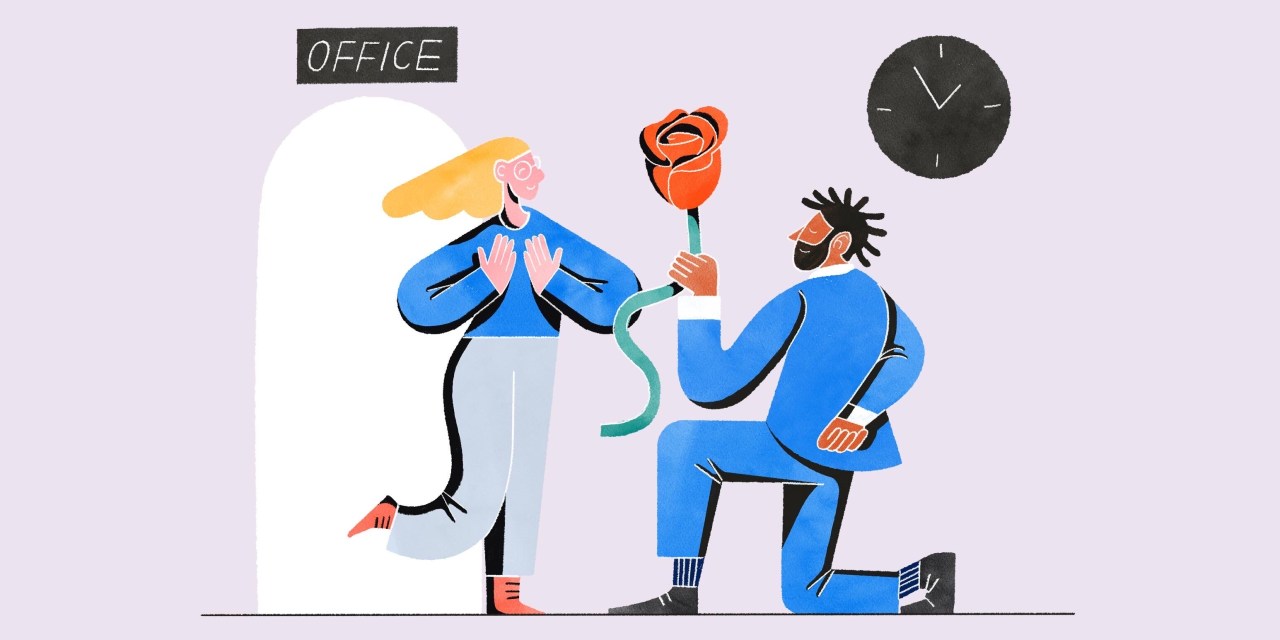Why people are returning to offices for romance

Dating app fatigue is leading young singles to look for romance in more traditional settings — like the office.
As the return to office tug of war continues between employers and employees, one incentive for some to come back is the opportunity to meet a romantic partner or simply enjoy the fun of having an office crush.
The pandemic and rise of remote work made socializing and dating far trickier over the past few years. More than 60% of single U.S. adults said dating got more difficult during the pandemic, according to a survey from the Pew Research Center conducted in February 2022, with Gen Z and younger millennials under the age of 30 much more likely to say so than daters older than 30 years old.
“We all have work crushes, it makes it a little bit more interesting,” said Shaina (she declined to give a last name), a 26-year-old scientist at a biotech company.
Shaina hasn’t recently returned to work, but is working in-person at a lab, and said coworker crushes, flirting and romances are a staple of many of her work peers’ daily lives. Most of those coworkers are looking for casual dynamics though and not wanting to pursue any serious relationships, she said.
About 40% of U.S. workers said they have flirted with someone from their workplace, and nearly a quarter have gone on a date with someone from work, according to an annual survey from the Society for Human Resource Management conducted in January that included over 600 respondents.
And 17% said they’ve been in an official relationship with someone from their workplace.
There are certainly some generational differences though. Some 33% of younger millennials and Generation Z workers said they’d be fine being in an office romance, compared to about 15% of older millennials, 27% of Generation Xers and 23% of Baby Boomers.
“They are the group [younger millennials and Gen Z] that’s most likely to be open to being in a workplace romance right now,” said Casey Sword, lead researcher of that report.
Aimee (she declined to give a last name) is a 24-year-old recent graduate who studied film and is living on the East Coast, but plans to move to California soon. She’s looking for a job there that requires her to work in-person after feeling a bit isolated during a remote internship.
“The idea of going out there and solely meeting people through apps is a little intimidating,” she said. “I’m trying to get myself in as many in-person activities and environments as I can,” she said.
But workplace relationships can certainly go sour. Younger workers who started jobs remotely are likely not yet fully accustomed to social norms governing what romances in professional office settings should look like, beyond what they’ve seen in the media.
Some key dilemmas they’ll have to understand include power imbalances in relationships between a superior and subordinate. “The big no is dating your boss,” said Amy Baker, an organizational psychology professor at the University of New Haven.
Perceived or actual favoritism, retaliation, and harassment are other major potential concerns that could arise from workplace romances, and employers and their HR teams should recognize those issues and ensure any related policies they make are made known to staff.
In SHRM’s 2022 survey, 77% of U.S. workers said their employer doesn’t require them to disclose a workplace romance. The same share who have been in a workplace relationship or are currently in one said they did not disclose it to their employers.
“This is just what workers understand and so it may not necessarily be true, workers may not have any idea what their employer policy is,” Sword said.
“That’s something employers should definitely communicate, especially now that we’re seeing more and more employees return to work and return to offices,” she said.
Keeping a workplace romance a secret can also lead to some resentment from coworkers kept in the dark.
“Eventually the nature of the relationship almost always becomes known, and then people feel betrayed,” Baker said.
You don’t have to go into great detail, “but I wouldn’t go to great lengths to hide it either,” she said.

